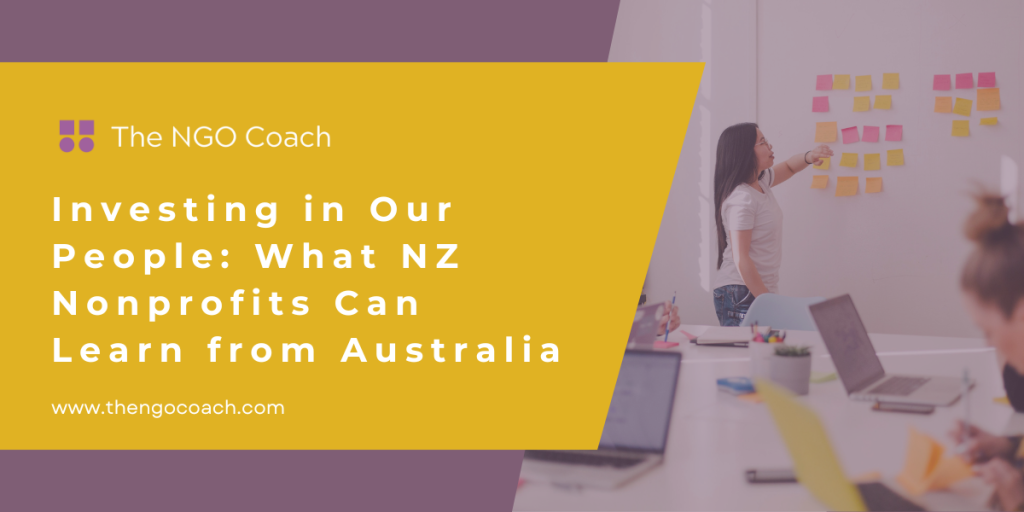In the NGO sector, the core of our work is in making a difference for those we serve—whether it’s addressing social inequities, supporting vulnerable communities, or being environmental stewards. However, the ability to create lasting change isn’t just about passion and dedication. It’s also about investing in the development of our people.
This week I’ve been reading this research from the Australian Centre for Social Impact—Learning for Purpose: Researching the Social Return on Education and Training in the Australian Not-for-Profit Sector. The report provides the first national documentation of the state of training and professional development in the Australian Not-for-Profit sector. Oh, how I wish we had similar research here in Aotearoa New Zealand!
As I’ve reflected this week, this research presents critical lessons for NGOs across our own motu. Here are my thoughts on how these findings are useful in a New Zealand context and how they can strengthen nonprofits and amplify our collective impact.
The Power of Professional Development
The Australian study highlights a simple yet powerful truth—when we invest in the professional development of our leaders, staff, and volunteers, we invest in the future of our organisations and the communities we serve. The research found that Australian nonprofits that systematically engage in training and development see significant improvements in organisational performance and social impact. For every dollar spent on governance training, there is a return of six dollars in economic value—a remarkable return on investment from the power of education and training.
This lesson is particularly relevant in Aotearoa New Zealand, where many nonprofits face similar challenges of limited resources and growing demands. By prioritising professional development, we can equip our people with the skills, knowledge, and confidence they need to lead effectively and manage resources efficiently. This, in turn, empowers them to navigate the complexities of today’s increasingly complex nonprofit environment.
Addressing the Skills Gap
One of the most pressing issues identified in the Australian report is the shortage of skilled workers in the nonprofit sector. We know this challenge all too well here in Aotearoa New Zealand. Whether it’s the difficulty in finding experienced governance board members or the challenge of attracting and retaining skilled kaimahi / staff (particularly managers), the gap in capability can impact our ability to achieve our missions.
The research talks about the importance of targeted training programmes that focus on specific nonprofit needs. By addressing key areas, we can ensure that our organisations are not just surviving but thriving. For NGOs here, this means taking a proactive approach to workforce development—seeking training opportunities, advocating for capacity-building funding, and creating a culture that values continuous learning. These are all things I’ve been advocating for many years.
Overcoming Barriers to Professional Development
Despite the clear benefits, the Australian research also points out that many nonprofits need help accessing the training they need. Common barriers include a need for more funding and time, with smaller organisations particularly impacted. These challenges are identical in Aotearoa New Zealand, where many nonprofits operate on shoestring budgets and rely heavily on volunteers.
So, how can we overcome these barriers? Firstly, we can advocate for more flexible funding that includes ability to prioritise professional development. Additionally, NGOs can explore collaborative training opportunities, sharing resources, and knowledge within their own networks to make professional development more accessible and affordable.
Building a Stronger, Smarter Sector
The Australian findings remind me that to create meaningful and sustainable change, we need to collectively work smarter, not just harder. This means building a collaborative environment that is resilient, adaptive, and equipped to meet future challenges. Here in Aotearoa New Zealand, where nonprofits play a crucial role in addressing social, environmental, economic, and cultural issues, the need for strong leadership and effective management and governance has never been greater.
I encourage nonprofit leaders to consider these insights. We need to make professional development a priority, not just an afterthought. Let’s invest in our people because when we do, we’re investing in the success of our missions and the well-being of our communities.
Together, we can build our NGOs as capable and confident in their ability to drive positive change. The lessons from Australia’s research are clear: the return on investing in our people is not just financial—it’s social, cultural, economic, and transformative. We need to begin prioritise professional development for our kaimahi to build our organisations and better serve our communities.
Remember: You need to nurture yourself first to enable you to keep nurturing others!

